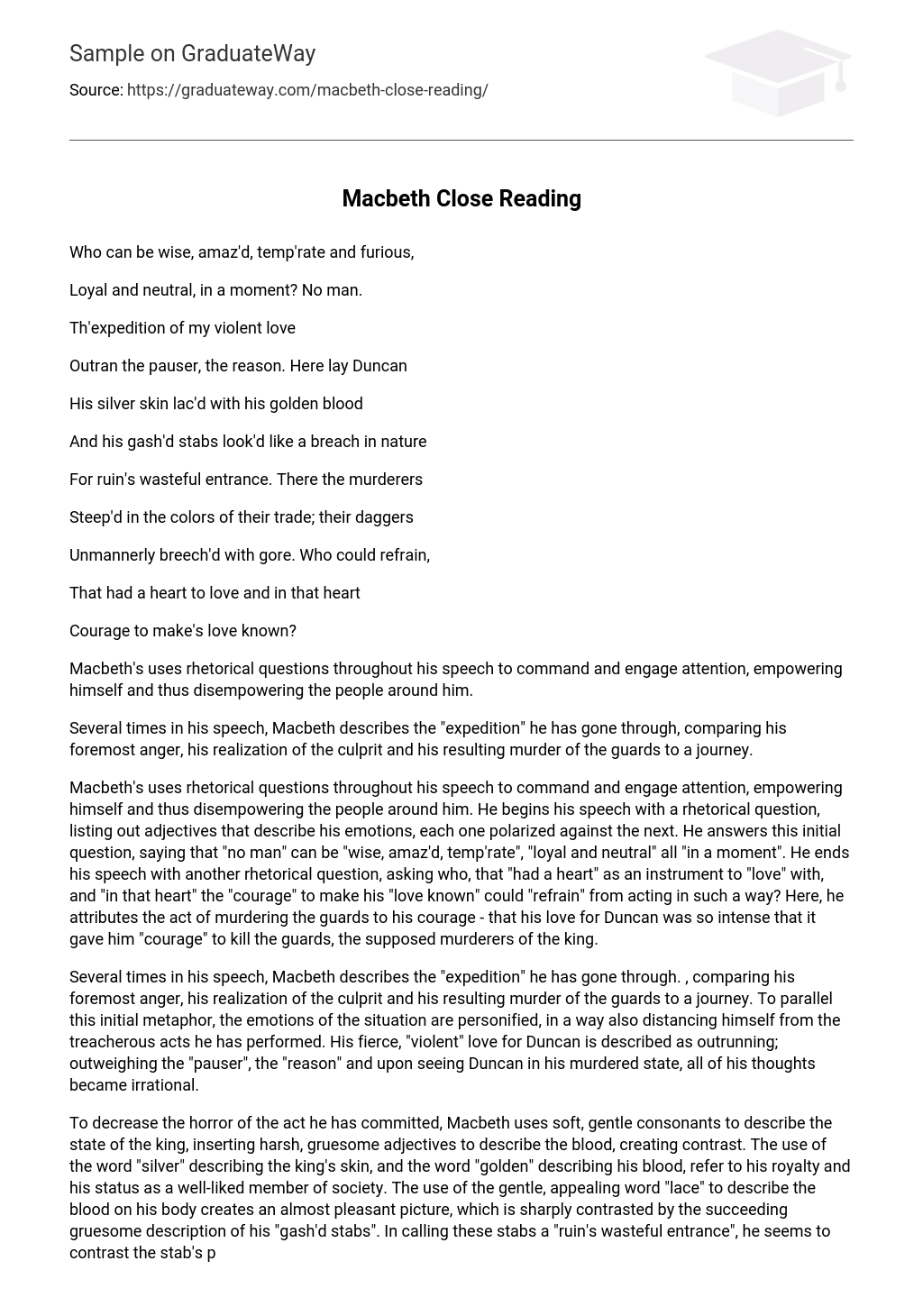Who can be wise, amaz’d, temp’rate and furious,
Loyal and neutral, in a moment? No man.
Th’expedition of my violent love
Outran the pauser, the reason. Here lay Duncan
His silver skin lac’d with his golden blood
And his gash’d stabs look’d like a breach in nature
For ruin’s wasteful entrance. There the murderers
Steep’d in the colors of their trade; their daggers
Unmannerly breech’d with gore. Who could refrain,
That had a heart to love and in that heart
Courage to make’s love known?
Macbeth’s uses rhetorical questions throughout his speech to command and engage attention, empowering himself and thus disempowering the people around him.
Several times in his speech, Macbeth describes the “expedition” he has gone through, comparing his foremost anger, his realization of the culprit and his resulting murder of the guards to a journey.
Macbeth’s uses rhetorical questions throughout his speech to command and engage attention, empowering himself and thus disempowering the people around him. He begins his speech with a rhetorical question, listing out adjectives that describe his emotions, each one polarized against the next. He answers this initial question, saying that “no man” can be “wise, amaz’d, temp’rate”, “loyal and neutral” all “in a moment”. He ends his speech with another rhetorical question, asking who, that “had a heart” as an instrument to “love” with, and “in that heart” the “courage” to make his “love known” could “refrain” from acting in such a way? Here, he attributes the act of murdering the guards to his courage – that his love for Duncan was so intense that it gave him “courage” to kill the guards, the supposed murderers of the king.
Several times in his speech, Macbeth describes the “expedition” he has gone through. , comparing his foremost anger, his realization of the culprit and his resulting murder of the guards to a journey. To parallel this initial metaphor, the emotions of the situation are personified, in a way also distancing himself from the treacherous acts he has performed. His fierce, “violent” love for Duncan is described as outrunning; outweighing the “pauser”, the “reason” and upon seeing Duncan in his murdered state, all of his thoughts became irrational.
To decrease the horror of the act he has committed, Macbeth uses soft, gentle consonants to describe the state of the king, inserting harsh, gruesome adjectives to describe the blood, creating contrast. The use of the word “silver” describing the king’s skin, and the word “golden” describing his blood, refer to his royalty and his status as a well-liked member of society. The use of the gentle, appealing word “lace” to describe the blood on his body creates an almost pleasant picture, which is sharply contrasted by the succeeding gruesome description of his “gash’d stabs”. In calling these stabs a “ruin’s wasteful entrance”, he seems to contrast the stab’s physical role as a channel for blood pouring out, against their metaphysical role as a “breach” for horrors pouring in and laying “waste” to “nature”. This is a visual amplification of the large amount of blood present, producing a dreadful albeit exaggerated description of the king’s murder, aiding in depicting its horrifying nature.
Throughout the speech, Macbeth consistently uses metaphors. After describing the king’s wounds in such a lurid manner; the only literal description throughout the entire passage, Macbeth retreats back to metaphors, describing the crime committed as a “breach in nature”, constituting as the “wasteful entrance” of “ruin”; an irrecoverable state of devastation. This is also a metaphor, comparing his wounds to a break in the shoreline. Next to this state of ruin, Macbeth saw “the murderers”, saying that the guards were the ones who had committed the crime. He came to this conclusion from seeing them “steep’d” in blood; the indicator of their guilt, the colored uniform of their trade, the badge of their murderous profession. Their daggers; the instruments of their trade, are described as being “unmannerly breech’d”, meaning that the daggers are improperly dressed, or wearing indecent clothing which personifies them by comparing the stained blood and “gore” as an unseemly garment.
The king is described throughout the passage in such a noble manner by Macbeth to excuse himself from murdering the guards. Throughout the passage, Macbeth approaches the entire matter with metaphors and also personifies the instruments of murder and the reasoning behind it; suggesting a distance, a mental barrier between himself and his treacherous acts, a possible indication of the fact that he, too, cannot bear to consider the bloody truth. His words are highly poetic and, also revealing of the deep ironies, of which he must be aware. He has destroyed the fabric of nature; he has paved the entrance of ruin. As he speaks, lies, manipulates and deceives, we feel a heightened state of awareness; realizing the dramatic irony of it all.





